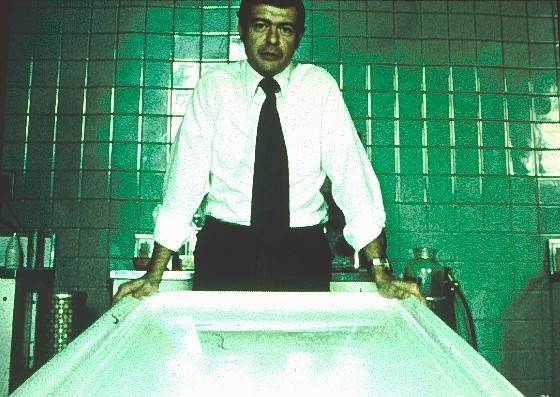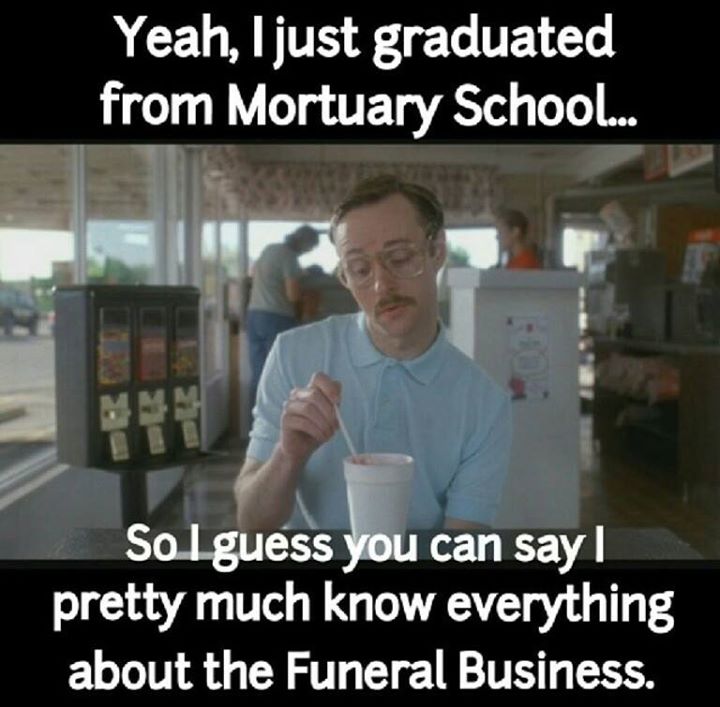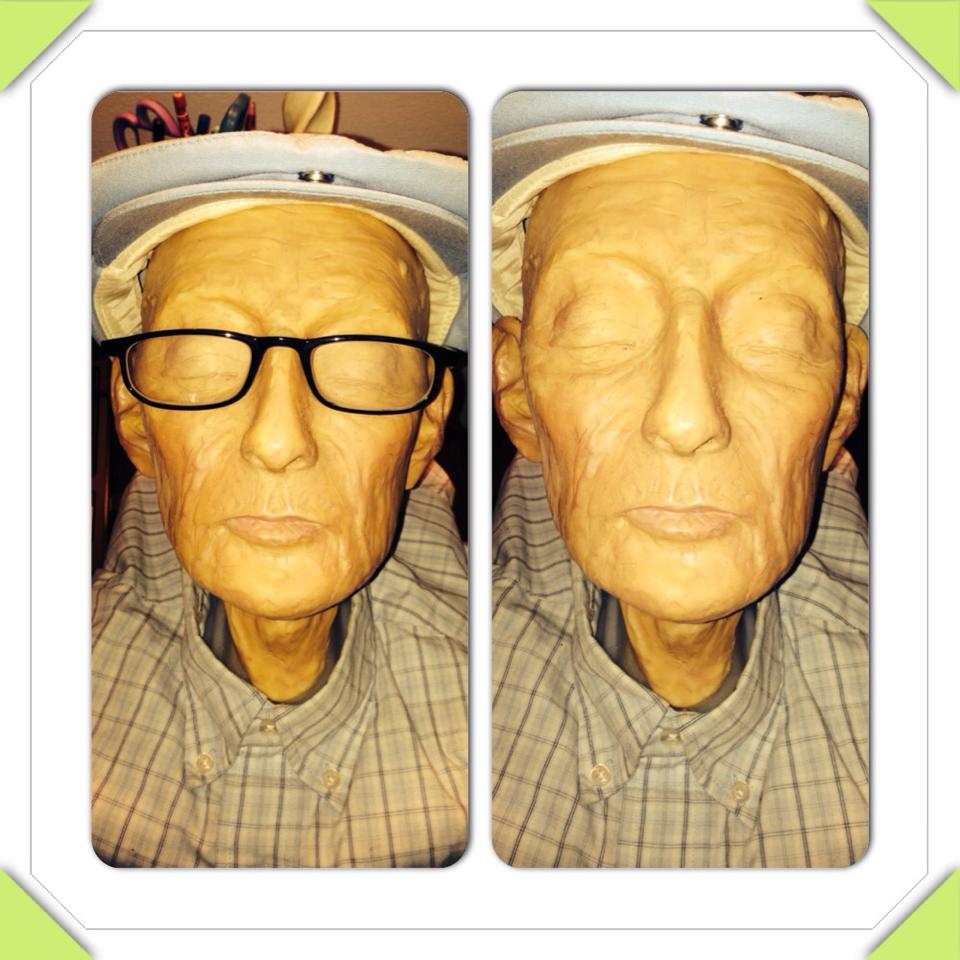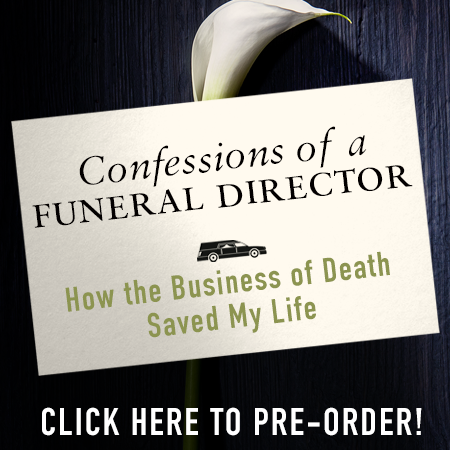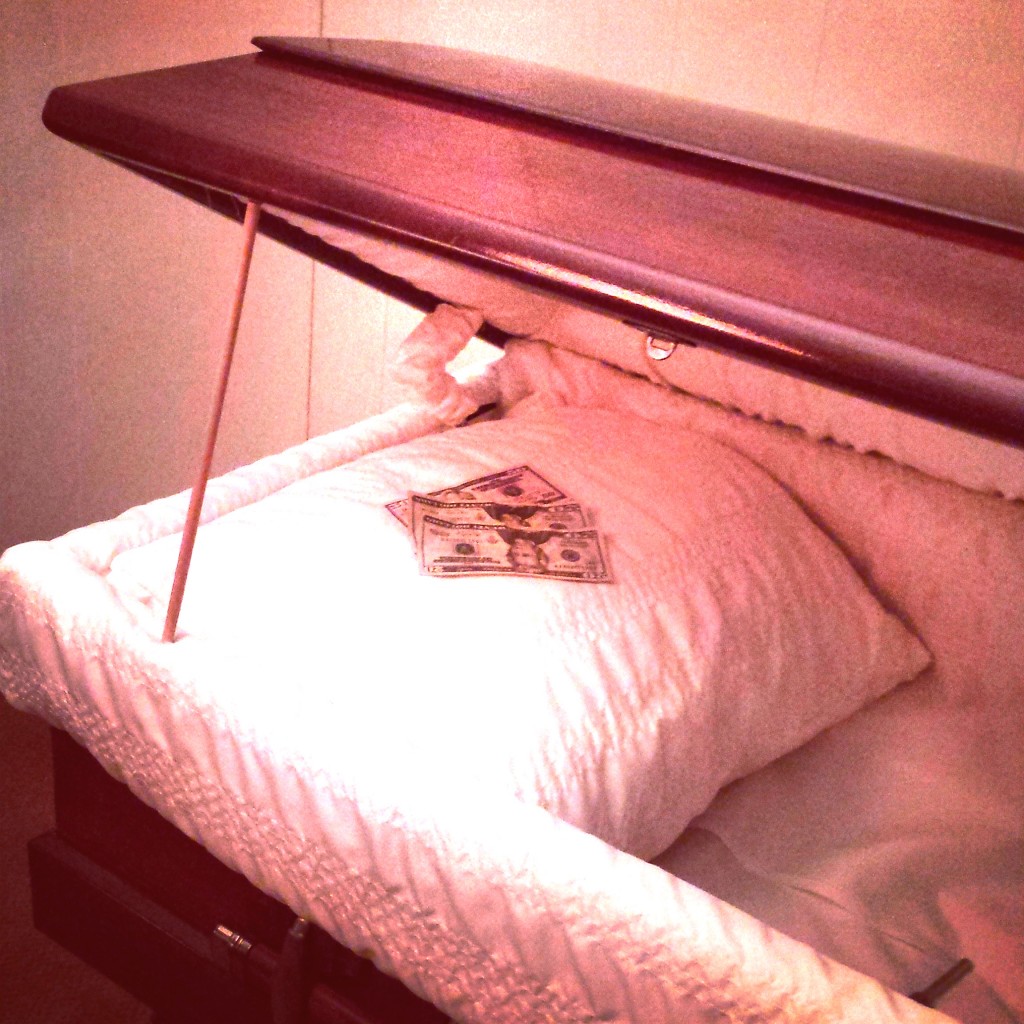Funeral Directing
Five Ways Funeral Directors Can Bully Their Customers
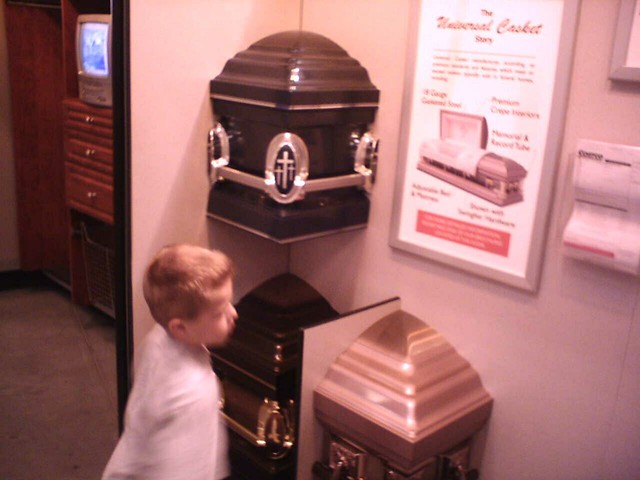
© 2006 Gregory Veen, Flickr | CC-BY-SA | via Wylio
There are bullies in every business. In the funeral industry — because of the customers emotional vulnerability and the fact that the purchases are often of high value — there’s a greater opportunity for bully funeral directors to exploit their customers.
Back in elementary school, I learned a lesson about bullies: they gain their value off provoking emotional reactions and thrive off feeling a sense of power over you. Take away the power, take away the emotional reactions, and — they might still be mean — but they no longer have the power and value they so desperately seek.
While I continue to believe that the majority of funeral director are honest, empathetic and service oriented, some funeral director will bully their clients into more expensive funerals, especially pricier vaults and caskets purchases. While the elementary school bullying has evolved, the intention is still the same: to exploit emotions and gain power.
Here are five ways — and some cliche lines — funeral directors use to manipulate their customers into upsells:
Creating false and/or unsubstantiated expectations:
If you buy this vault, your husband will be protected for ALL ETERNITY.
Buying this casket will ensure that your son will stay in perfect shape for the next hundred years.
Guilt Trip.
I’m sure he was the best dad ever. He certainly deserves the best casket.
I wouldn’t put my dog in that vault.
You may not have been able to provide the best stuff for your son in life, but you can give him the best in death.
Emotional Manipulation.
I hate the thought of worms eating my loved one’s flesh, which is why this sealer vault gives me peace of mind.
Can you put a price on your peace of mind?
Religious Persuasion.
Jesus Christ had a sealer tomb.
Insects, mice, nothing can get into this casket except the Lord Jesus Christ on Resurrection Day.
(I’ve actually heard of funeral directors who dissuade customers from cremation with religious reasons. Yes, Islam and Judaism traditionally prohibit cremation, but all Christian traditions [except for Eastern Orthodoxy] allow for the cremation of the deceased’s remains).
Aggressive Sales Tactics.
THIS is the casket you need.
I KNEW your father and I KNOW that your father would want this vault.
You don’t want a CHEAP casket. Do you?
*****
As I’ve said before, if you EVER feel like you’re being manipulated or exploited by a funeral director, fire your funeral director. Walk out and tell them, “I’m taking my business somewhere else.” Death causes us to be emotional vulnerable and the last thing you need is a funeral director attempting to weasel his/her way into your wallet.
If you’re already the type of person who is susceptible to manipulation (you’re a “people pleaser”, you lack assertiveness, low self-esteem, etc.), it’s smart to bring someone with you when you to make arrangements. The last thing you need while coping with a death is to feel like you’ve been exploited by a funeral director.
Common Funeral Myths
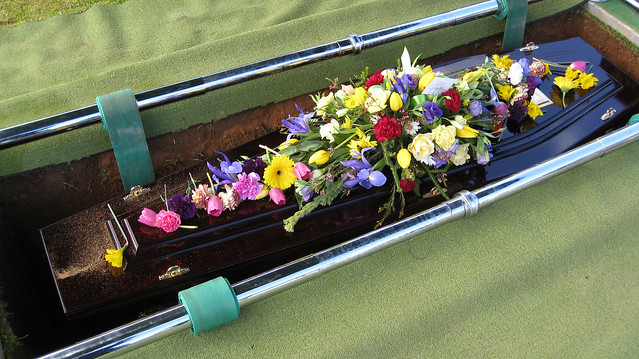
© 2009 Stephan Ridgway, Flickr | CC-BY | via Wylio
Today’s guest post is from Funeral Consumers Alliance:
1. Embalming is required by law. Embalming is NEVER required for the first 24 hours. In many states, it’s not required at all under any circumstances. Refrigeration is almost always an alternative to embalming if there will be a delay before final disposition.
2. Embalming protects the public health. There is NO public health purpose served by embalming. In fact, the embalming process may create a health hazard by exposing embalmers to disease and toxic chemicals. In many cases, disease can still be found in an embalmed body. A dead body is less of a threat to public health than a live one that is still coughing and breathing.
3. An embalmed body will last like the “beautiful memory picture” forever. Mortuary-type embalming is meant to hold the body only for a week or so. Ultimately, the body will decompose, even if it has been embalmed. Temperature and climate are more influential factors affecting the rate of decomposition.
4. Viewing is necessary for “closure” after a death. When the death has been anticipated, family members have already started their “good-byes.” There is relatively little need to see the body to accept the reality of death. In fact, according to a 1990 Wirthlin study commissioned by the funeral industry, 32% of those interviewed found the viewing experience an unpleasant one for various reasons.
5. “Protective” caskets help to preserve the body. While gasketed caskets may keep out air, water, and other outside elements for a while, the body will decompose regardless. In fact, a gasketed or “sealer” casket interferes with the natural dehydration that would otherwise occur. Fluids are released from the body as it begins to decompose, and the casket is likely to rust out from the inside.
6. “Protective” or sealed vaults help to preserve the body. Nothing the traditional funeral industry sells will preserve the body forever. If there is a flood, however, such vaults have popped out of the ground and floated away. (Mass graves after the plague in England were ultimately found to be without health problems, according to the 1995 British health journal Communicable Disease Report. Burial in containers, however, often kept the disease “encapsulated.”)
7. Coffin vaults are required by law. NO state has a law requiring burial vaults. Most cemeteries, however, do have such regulations because the vault keeps the grave from sinking in after decomposition of the body and casket, reducing maintenance for the cemetery workers. Grave liners are usually less expensive than vaults. New York state forbids cemeteries from requiring vaults or liners, in deference to religious traditions that require burial directly in the earth. Those who have started “green” burial grounds do not permit vaults or metal caskets.
8. Vaults are required for the interment of cremated remains. Alas, with the increasing cremation rate, many cemeteries are making this claim, no doubt to generate more income. There is no similar safety reason as claimed for using a casket vault. Any cemetery trying to force such a purchase should be reported to the Federal Trade Commission for unfair marketing practices: 877-FTC-HELP.
9. What is left after the cremation process are ashes. When people think of “ashes” they envision what you’d find in the fireplace or what’s left over after a campfire. However, what remains after the cremation process are bone fragments, like broken seashells. These are pulverized to a small dimension, not unlike aquarium gravel.
10. Cremated remains must be placed in an urn and interred in a cemetery lot or niche. There is no reason you can’t keep the cremated remains in the cardboard or plastic box that comes from the crematory. In ALL states it is legal to scatter or bury cremated remains on private property (with the land-owner’s permission). Cremation is considered “final disposition” because there is no longer any health hazard. There are no “cremains police” checking on what you do with cremated remains.
11. It is a good idea to prepay for a funeral, to lock in prices. Funeral directors selling preneed funerals expect the interest on your money to pay for any increase in prices. They wouldn’t let you prepay unless there was some benefit for the funeral home, such as capturing more market share or being allowed to pocket some of your money now. Prepaid funeral money is NOT well-protected against embezzlement in most states. Furthermore, if you were to move, die while traveling, or simply change your mind—from body burial to cremation, perhaps—you may not get all your money back or transferred to a new funeral home. The interest on your money, in a pay-on-death account at your own bank, should keep up with inflation and will let you stay in control. Please note: We’re seeing more low-cost, low-overhead funeral operations opening up, so prices may go down in the future in areas with open price competition.
12. With a preneed contract, I took care of everything. There are over 20 items found on many final funeral bills that cannot be included in a preneed contract because these items are purchased from third parties and cannot be calculated prior to death. Extra charges after an autopsy, clergy honoraria, obituary notices, flowers, the crematory fee or grave opening are typical examples. All such items will be paid for by the decedent’s estate or family, in addition to what has already been paid for in the preneed contract.
13. Insurance is a good way to pay for a funeral. Interest accrued by an insurance policy may be outpaced by funeral inflation and is generally less than what is earned by money in a trust. When a funeral is paid for with funeral insurance, either the funeral director will absorb the loss (and many reluctantly do)—OR figure out a way for your survivors to pay a little more: “The casket your mother picked out is no longer available. You’ll have to pick out a new one, and the price has gone up.” If what you have is life insurance, not funeral insurance, it may be considered an asset when applying for Medicaid. In that case, you’ll have to cash it in, getting pennies on the dollar. The same may be true if you’re making time payments on your funeral insurance, and, in hard times, you decide to stop making payments. In fact, the company may be able to keep everything you paid, as “liquidated damages.”
14. If you have a Living Will you won’t linger on with a lot of feeding tubes and extraordinary measures. One of the findings from a major study supported by the Robert Wood Johnson Foundation was that hospitals often fail to comply with Living Wills. The Living Will is more likely to be honored when there is an aggressive family member to intercede, especially if that person also has a Durable Power of Attorney for Health Care.
Copyright © FCA
*****
Funeral Consumers Alliance is a nonprofit organization dedicated to protecting a consumer’s right to choose a meaningful, dignified, affordable funeral.
You can visit their website HERE.
10 Marks of a Good Funeral Director
Over the past couple days I’ve been thinking about the question “what makes a good funeral director?” I wrote down 50 plus characteristics. Then I tried to find 10 that I thought were more essential than the others. Below are those 10.
But, these 10 “essentials” are very much opinion. In reality, the answers are quite relative … relative to a funeral director’s demographic, relative to funeral directors cultural expectations and relative to the funeral director’s personality.
With that in mind, let me be the first to say that this list is horribly inadequate. Nevertheless, here are 10 marks of a good funeral director.
1. Emotional Capital:
Funeral directors are paid to be the stable minds in the midst of unstable souls. We often dwell in the darkness and stare into the void. It takes emotional resiliency to bury a child. It takes emotional capital to bury the mother of three young children. If you don’t have that emotional capital, you’ll go bankrupt.
2. Altruism:
Most of us get our emotional capital by helping others. And although I’ve heard funeral directors say “I’m here to serve” a thousand times, the truth is this: If serving others is the core reason you’re in this industry, if service is your “calling”, you’re doing it right.
3. Continuing Education:
I’ve actually learned a thing or two at continuing education courses. But, I’m not talking about those mandated course hours here. I’m talking about the fact that a good funeral director (like in every field of life) always has a desire to expand their understanding. A good funeral director is alway considering new perspectives and challenging their mind to think outside the proverbial box.
4. Business Savvy (specifically for managers and owners):
The more money you can save the more of those savings can be passed back to the customer. Too often it is the mismanaged funeral homes that end up having to charge exorbitant amounts of money in order to support their bad business decisions.
5. Good Teachers
You don’t know everything. You will never know everything. You will always need teachers in your life.
6. Good co-workers/bosses/employees:
The funeral industry isn’t like the NBA where one player can take over and win the game nearly on their own. The funeral industry is more like the NFL. Sure, there are franchise players, but it’s much more of a team sport. And if you’re playing on a bad team, it’s really hard to do your job well. But, if you’re on the right team, your gifts can shine.
7. Internal Locus of control.
“Internal locus of control” is a more technical way of saying “a person with a high sense of personal responsibility.” This business moves too fast for us to always be dependent on our bosses. And at time, this business most so slow that you’ve got to look for things to be do. The blame game doesn’t work in this industry.
8. Empathy and sympathy.
Imagine being at the bottom of a deep, dark hole. Peer up to the top of the hole and you might see some of your friends and family waiting for you, offering words of support and encouragement. This is sympathy; they want to help you out of the pit you have found yourself in. This can assist, but not as much as the person who is standing beside you; the person who is in that hole with you and can see the world from your perspective; this is empathy. — Dr Nicola Davies
There are times (at funerals especially) when all we can give is sympathy. When it’s outside of our ability to fully empathize with a person’s situation. After all, the person laying in the casket isn’t my father. This isn’t my daughter. This isn’t my family.
And that’s our job. You pay us to be directors. And we couldn’t handle much more. We have to maintain a certain level of objectivity because there’s only so much pain, grief and heartache we can share until we too start to crash … burn out.
But, there’s other times when you can’t help but be drawn into the narrative, so that you enter the narrative and become a character in the story. Not just a director, but an actual character in the drama of life and death.
Knowing the difference between empathy and sympathy and having the ability of to use both is what can separate an average funeral director from a good one.
9. Integrity.
Integrity is doing the right thing when nobody is looking. The funeral industry is full of closed doors; and many of our jobs are performed behind closed doors. A good funeral directors is respectful in public and in private.
10. Honesty.
Honesty in the funeral industry looks something like this: admitting our mistakes when we’re wrong, doing our best to communicate truthfully to our customers and our co-workers and making sure we aren’t exploiting anyone.
*****
This “list” is missing something … your perspective. What do you think characterizes a “good funeral director”?
21 Spectacular Examples of What Mortuary Students Do in Mortuary School
Most of us who attend mortuary school were required to take a class called “Restorative Art”. The Restorative Art and Science textbook states, “Restorative art is defined as the care of the deceased to recreate natural form and color. In our attempt as funeral service practitioners to restore the deceased human remains to its most natural appearance, we predicate our efforts on the scientific understanding of the human facial and cranial form.”
The culmination of our “scientific understanding of the human facial and cranial form” is the “wax head.” We are given a plastic skull (see below) and a bunch of wax (or clay). Our job is to make the wax head look like an actual face. Some of us aren’t too good at it (mine was a poor resemblance of my wife), and others are spectacular. 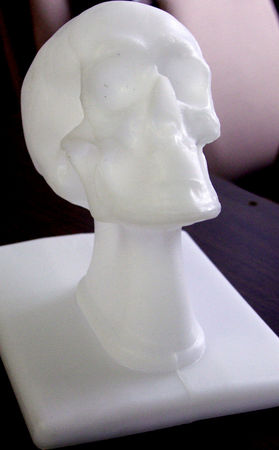
On my Confessions of a Funeral Director Facebook page, I asked those who have completed a “Wax Head” to show their work. Out of the nearly 100 who responded, I took the ones that garnered the most likes (although the Worf and Spock ones were my personal favorites, so I added them too).
One.
By Morticia Addams
Two.
Three.
Four.
Five.
Six.
Seven.
Eight.
Nine.
Ten.
Eleven.
Twelve.
Thirteen.
Fourteen.
Fifteen.
Sixteen.
Seventeen.
Eighteen.
Nineteen.
Twenty.
Twenty One.
If you’re interested in the life of a funeral director, you might be interested in my book!
10 Ways the Funeral Industry Can Entrap an Undertaker’s Personal Life
Every business has its pitfalls … traps that can ensnare our lives and our relationships with ourselves, our family and our friends. Here are ten traps in the funeral industry that can hurt the personal lives of its workers.
One. Perfectionism
Mistakes are always magnified by a high level of emotional intensity. If you’re not a perfectionist when you enter the funeral industry, you will be when you leave it. There’s a thousand details involved in a funeral and every one has to be right. Perfectionism isn’t bad per se; in fact, it’s a good thing for the funeral practitioner. What I struggle with is when I bring that perfectionism home to my spouse, to my son, to my friends.
Two. Lack of Boundaries
Work has never hurt me. Good work is fuel to the body and soul. And the funeral business is good work. It’s easing an otherwise impossible task for the bereaved. In fact, it’s such good work that many directors marry this business. It’s easy to marry this business.
To commit to it as your first love. It’s easy to pledge your heart to this one thing and no other.
It’s easy to let your own family take second in your priority list.
It’s easy to allow your personal life to get swallowed up by the voracious appetite of death care.
As long as you’re on call (and many of us are on call 24/7), you’re tied to the business. That’s okay. We’re here to respond to both life needs and death needs; but, the fact that it’s nearly impossible to “leave” work at work, is why it’s easy to capitulate to the funeral industry’s proposal. And once you marry this business, it’s really hard to divorce it.
Three. Psychosis.
Psychologist Carl Rogers described how he “literally lost my “self”, lost the boundaries of myself…and I became convinced (and I think with some reason) that I was going insane”. When we in human service, and death service, become pulled into the whole narrative of death and dying, we can lose ourselves. When we can’t separate our personal lives from our business life, we’ve probably gone beyond the boundaries of normalcy and into psychosis.
Four. Money, money, money, MO – NEY.
You can make money in this business. Like every business, you can make honest money and dishonest money. Unfortunately, in this business, because of the confusion of grief and the lack of price standardization, there’s opportunity to make dishonest money. Don’t sell your soul. One of the greatest regrets dying people have on their deathbed is that they worked too hard and didn’t spend more time with their family and friends.
Five. Isolation by Profession.
Death makes us different … not necessarily unique, just different. This difference creates a chasm between us and those not immersed in death. Like police, doctors, psychologist, etc. have chasms created by their professions, ours creates us into something other. And when we’re isolated by our job, sometimes it’s easy to simply disconnect to those who don’t understand us.
Six. Codependency
Most people enter the funeral industry because they love to serve others. The desire to serve/help/love is a healthy response to bereaved persons. The unhealthy side is when those service oriented people of the funeral industry use the the grief buzz of the funeral industry to satisfy their own emotional needs. People who become codependent on the funeral industry place a lower priority on their own needs, while being excessively preoccupied with the needs of others. Codependency is a trap.
Seven. Narcissism
Unfortunately, many funeral directors become narcissists (the funeral industry also has a tendency to harbor narcissists who gravitate towards the pomp and professionalism of funeral service). And while it would be easy to simply call these guys and girls “jerks”, the situation is usually more complex. For many, the tendency for funeral directors to become self-absorbed isn’t a product of nature, but of nurture. And when we give in to Narcissism, we’ll do anything to protect our image.
Eight. Pretentious Bosses and Coworkers
In addition to narcissistic funeral directors, there’s also a bunch of pretentious funeral directors (I suppose the two go hand in hand). Pretentiousness is so rampant in this industry it was even noted by FTC’s investigative report on funeral industry practices. That’s right, one of the reasons the funeral rule exists is because funeral directors pump up their image. We have a history of pretentiousness, as one of the main thrusts behind the rise of mortuary schools and the various associations at the turn of the twentieth century was to put us on the same plain as medical doctors, an attempt that is pretentious in itself.
The FTC writes, “the industry tends to promote the professional image and fight anything that would interfere with it or would … come between it and the consumer …. The more the public accepts the professional role, the less it will inquire, shop or bargain, and the greater the opportunity for high mark – ups.”
You’ll find many of the pompous “professionals” in the funeral industry and many of them can make your life a living hell.
Nine. Emotional Suppression.
We are paid to be the stable minds in the midst of unstable souls. We withhold and withhold and withhold and then … then the floodgates open, turning our normally stable personality into a blithering, sobbing mess, or creating a monster of seething anger and rage. During different occasions, I have become both the mess and the monster. The difficulty is only compounded by the fact that you just cannot make your spouse or best friend understand how raising the carotid artery of a nine-month old infant disturbs your mind.
Ten. Emotional Displacement
And we often displace our suppressed emotions on those closest to us with some kind of aggression. In an attempt to cope and find a sense of control in our uncontrolled and unpredictable world, we will often emotionally and verbally manipulate and control our family, co-workers, employees, associates and those closest to us, making us seem nearly bi-polar as we treat the grieving families that we serve with love and support and yet treat our staff and family with all the emotional turmoil that we’re feeling inside.
*****
If you’ve fallen into any of these traps (and believe me, I think we’ll all fall into at least one trap in our career), there’s always help and there’s always a way out.
Maybe I’m wrong, but I’ve noticed that the funeral industry doesn’t offer a good support system when it comes to the personal mental and physical health of its workers. When one of us falls into one of these traps, there’s rarely someone there to council you.
And maybe it’s time to change that. Maybe it’s time we start recognizing the traps of this industry.
So, if you’re trapped right now, let me encourage you: seek help. If you’re robbing your family and friends, the people you serve and yourself, it’s time to make a change.
